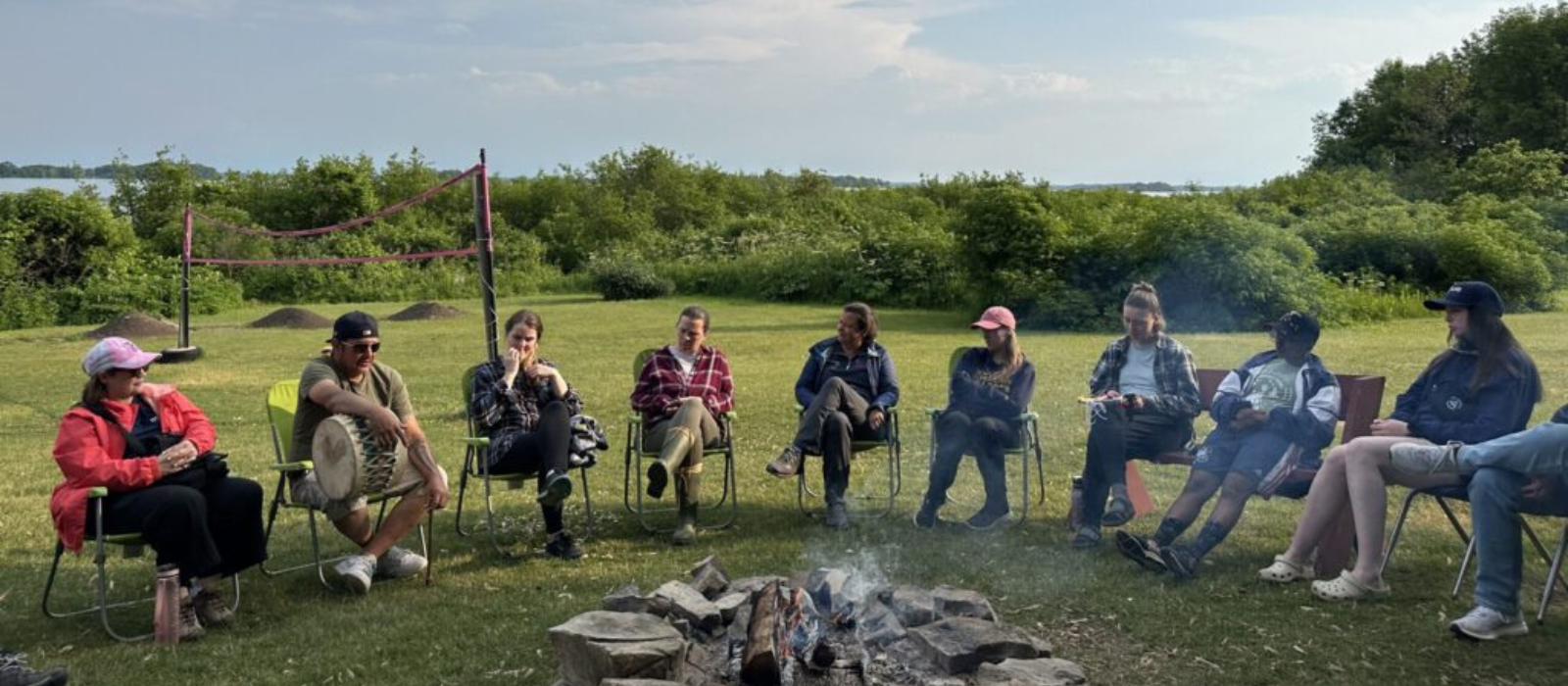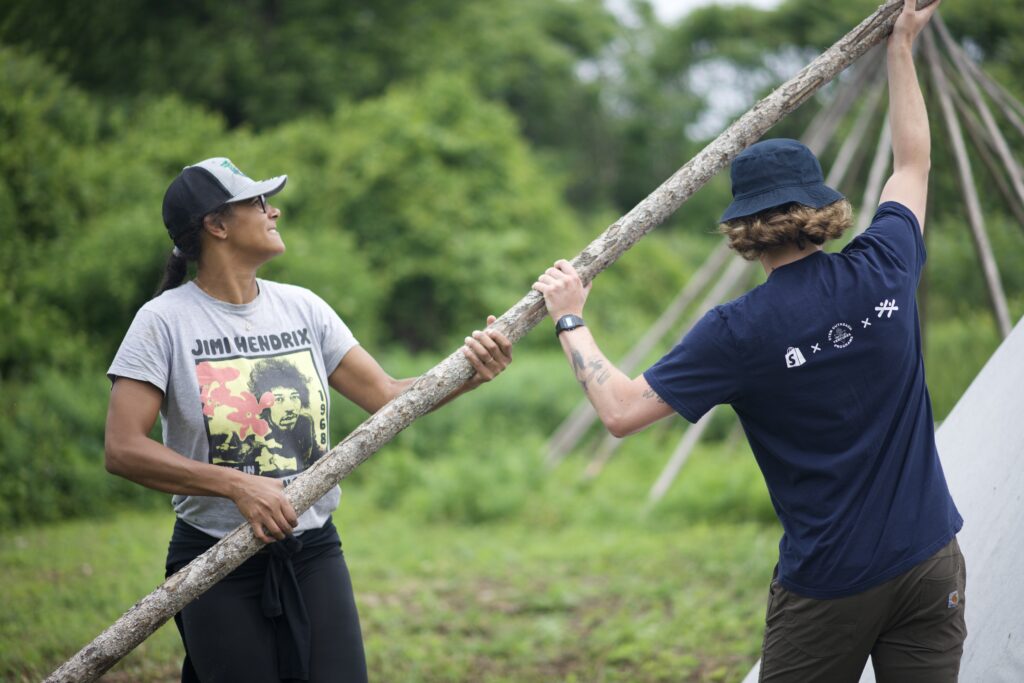An Indigenous Cultural Learning Experience for Teachers
Actua
Heather Lindale, OCSB
Science, Technology, Engineering and Math (STEM) education is an essential foundation for future career success and Actua network member, Virtual Ventures, is passionate about ensuring all youth in Canada have it. However, not all youth in Canada have equal access to STEM education, nor do all youth feel welcomed within it.
Actua’s National Indigenous Youth in STEM (InSTEM) Program, established over 20 years ago, is designed to break down barriers to Inuit, Métis and First Nations youth engagement in STEM fields. These are barriers that, over time, have contributed to significant disparities in high school and post-secondary participation and completion rates among Indigenous youth. Guided by Actua’s Indigenous leadership team, InSTEM engages Indigenous youth in culturally relevant STEM experiences that build skills and confidence and allow participants to recognize and celebrate their existing cultural knowledge as Indigenous Peoples.
As part of this program, Actua and Network Member Virtual Ventures of Carleton University recently hosted an immersive InSTEM educator land camp at the Thompson Island Cultural Camp in Akwesasne.
Connecting Indigenous Knowledge with STEM
From June 13 to 16, 2023, 13 educators from Ontario participated in the Akwesasne InSTEM Educator Land Camp. This unique program provided an immersive learning experience for educators, combining Indigenous Knowledge with Western STEM concepts. The objective was to enhance and create awareness in the educators’ understanding of the profound value of Indigenous Ways of Knowing and their role in science, technology, engineering and math. By nurturing this understanding, educators can better support Indigenous youth in their educational journeys.

“Indigenous youth need to see themselves reflected in STEM fields to feel connected and confident within them. This educator land camp is one step in the education pathway to support this,” says Doug Dokis, Actua’s INSTEM Program Advisor.
Indigenous youth need to see themselves reflected in STEM fields to feel connected and confident within them. This educator land camp is one step in the education pathway to support this.
Where Culture and STEM intersect
The land camp included a wide range of engaging activities that allowed participants to learn how Indigenous Knowledge and STEM concepts align. These activities, which included a cultural build, ceremonies, and hands-on STEM lessons, were led by Indigenous Knowledge Keepers and Cultural Practitioners, as well as the Actua and the Virtual Ventures teams. Key learnings across all activities and teachings included the importance of relationships with the land, reciprocity and sharing knowledge.
Cultural Practitioner Perry McLeod-Shabogesic created a space of learning and reflection across all four days, guiding the educators through various builds, including a medicine wheel, shaker and Tipi. As Perry guided educators through the Tipi build, he shared his knowledge and provided the opportunity for educators to make and learn connections to engineering and math alongside traditional Indigenous teachings.
Perry showed educators how to create their own medicine wheels, explaining its significance and how to personalize it to reflect their lives. They also created shakers using rawhide and materials they harvested from the land. This full-day process involved carefully cutting the rawhide, soaking the hide in the river, letting it dry and stringing all the pieces together.
Another key component of Indigenous cultures is storytelling, and this played a significant role during the camp. The educators in attendance had the honour of listening and learning from Knowledge Keepers and Cultural Practitioners who shared stories and the ceremonies they participate in and lead within their communities and elsewhere.
Notably, Thompson Island Cultural Camp Coordinator Norman Peters shared stories about his childhood and his family as he prepared a fresh-caught sturgeon. He talked about learning to fish with his grandfather, the tools he uses, some of the ways his grandmother would cook the fish, and how he is asked to catch one for important feasts in his community. Camp participants also got to enjoy the beautifully smoked and pan-fried fish later that same day.
Music is another important tradition within many Indigenous cultures, as learned through the Shakers and various ceremonies. Sitting around the fire, Forest Light played his hand drum and sang, later explaining the meanings of the songs and who wrote them, how he learned them and what singing and the hand drum mean to him and his family. He shared his family’s histories and ceremonies, including the Sundance Ceremony and its significance. The educators around the campfire were moved by his stories and appreciated his willingness to answer their questions and help them learn more about the significance of music for different Indigenous Peoples and communities.

“We are all honoured to have shared in our learning at the Akwesasne InSTEM Educator Land Camp, and are equally as grateful to the Thompson Island Cultural Camp and the Indigenous Knowledge Keepers and Cultural Practitioners who welcomed us and created this opportunity to learn more about their traditions and Ways of Knowing,” said Abbey Ramdeo, Specialist in Equity, Diversity and Inclusive Education at Actua. “The ceremonies, cultural builds and teachings led by Perry, Norman, Jasmine, Nihahsennaa and Forest allowed us to create connections, understanding and appreciation. This will help us foster more inclusive spaces and teaching practices, inside and outside of STEM classrooms.” Abbey spent all four days at the camp.
Integrating STEM into Indigenous Experiences
Included as part of the learning experience, Actua and Virtual Ventures delivered STEM activities that aligned with Two-Eyed Seeing, which is a concept by Mi’kmaw Elder Albert Marshall that encourages ‘Learning to see from one eye with the strengths of Indigenous Knowledge and ways of knowing, and from the other eye with the strengths of Western knowledge and ways of knowing… and learning to use both eyes together, for the benefit of all’.
Participants engaged in various activities on physics, biology, chemistry and digital skills with relevant connections to the land camp. For example, one activity used titration so that educators could explore how vitamin C is prevalent in berries and plants on the island that they learned about during a medicine walk. This activity provided an example of how Indigenous concepts can intersect with Western scientific principles.
“This integration encourages teachers to explore innovative ways to connect Indigenous culture and STEM education, ultimately benefiting Indigenous youth,” says Kyra Bloomfield, Program Director of Virtual Ventures. “This type of land camp is not just for educators though. We’ll be returning in July with Indigenous high school youth for our fifth InSTEM land camp held at Thompson Island Cultural Camp since 2017.”
An Immersive Experience in an Inspiring Environment
The Akwesasne InSTEM Educator Land Camp went beyond the conventional classroom setup, allowing participants to stay at the camp day and night. Cold swims in the St. Lawrence River provided refreshing breaks, while late nights were filled with storytelling and reflection around the campfire. The educators spent their nights in a traditional longhouse, further helping to build a deeper sense of connection and appreciation for Indigenous cultures.

“The Akwesasne InSTEM Educator Land Camp was a transformative experience for the participating educators,” says Janelle Fournier, Actua’s Manager of Education, who also spent all four days at the camp. “We’re grateful to the people of Akwesasne for welcoming us onto their lands so that we could engage teachers in such an incredible learning experience.”
“We recognize the importance of fostering Indigenous representation in STEM and a key element of that is helping teachers support Indigenous students to grow their confidence within it. The InSTEM land camps, whether working directly with youth or engaging with their teachers, are an important way we can contribute to that ultimate goal,” says Christine Riddell, Executive Director of Virtual Ventures.
About Virtual Ventures
Virtual Ventures is a not-for-profit organization run under the Faculty of Engineering and Design at Carleton University that offers nationally recognized science, technology, engineering, and mathematics (STEM) programming for youth in the Ottawa region ranging from those who have completed junior kindergarten up to students in grade 12. Initiatives run through Virtual Ventures include summer camps, fall and winter clubs, school outreach workshops, InSTEM (Indigenous Youth in STEM) programs, Girls Outreach Events and more.
About Actua
Actua is Canada’s largest science, technology, engineering, and mathematics (STEM) youth outreach organization representing over 40 university and college-based members. Each year, Actua’s growing network of member organizations engages over 350,000 young people in 500 communities nationwide in transformative STEM learning experiences that build critical skills and confidence. Actua focuses on engaging underrepresented youth through specialized programs for Indigenous youth, girls and young women, at-risk youth, and youth living in Northern and remote communities. Its major funding partners include the Government of Canada, the Natural Sciences and Engineering Research Council of Canada, RBC Foundation, the Suncor Energy Foundation, Google.org, Toyota Canada Foundation, Finning, CIBC Foundation, Enbridge, and Microsoft Canada.